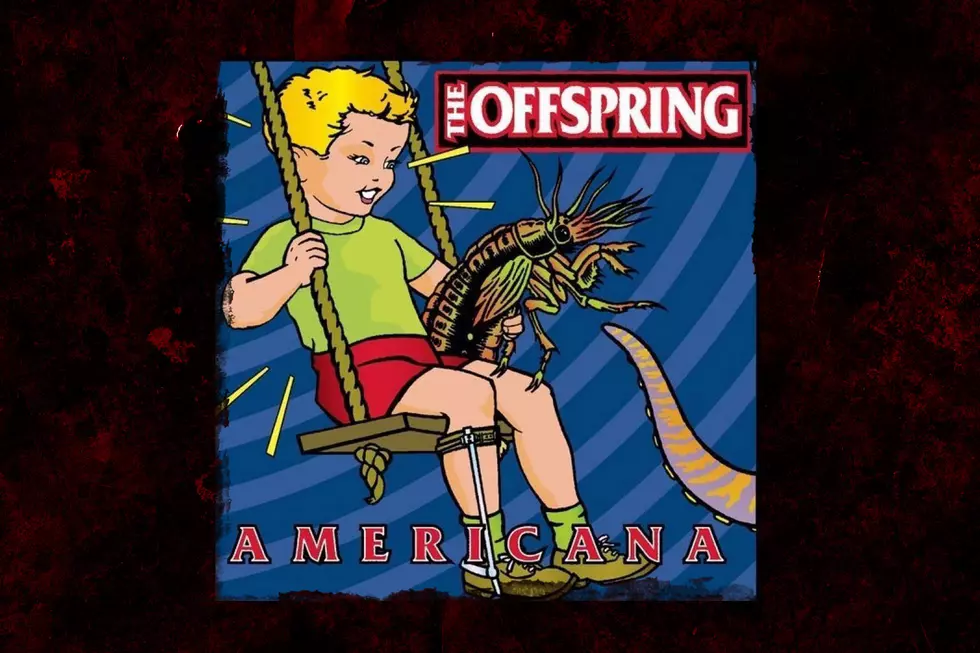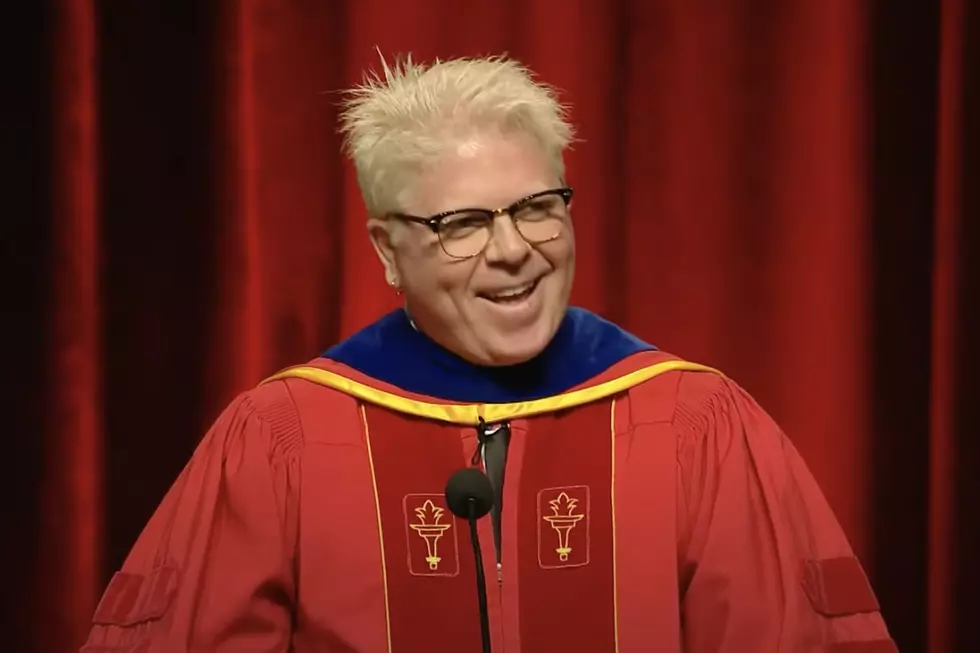
25 Years Ago: The Offspring Reflect Their World With the Release of ‘Americana’
Call it a sign of the times. The Offspring had evolved musically with their previous record Ixnay on the Hombre, though the creative growth didn't exactly yield the commercial returns expected, but inspired by a solid touring run and finding comfort in where they were as a band, The Offspring made a quick turnaround for their 1998 release Americana.
By today's standards, Ixnay had a relatively short run arriving in February 1997, with just a year of touring before the band jumped into new music, but that's due in part to the passion The Offspring were feeling for their writing at the time. The band called in producer Dave Jerden, who had also worked with them on Ixnay on the Hombre, and right after their touring had concluded, they started work in Burbank in July of 1998.
Singer Dexter Holland told Guitar World, "The idea wasn't to reinvent the wheel. We expanded our horizons on our last record and that's okay, but I don't feel like you have to be a completely different band on every record." As the group started to write, a theme began to form. “A lot of the things that I started writing I realized were kind of this theme of American culture in 1998; that is what Americana is: American culture," Holland told Billboard.
"I was thinking about how today’s America is distorted really. It’s not Norman Rockwell anymore; it’s Jerry Springer. It’s not live on the farm; it’s going to Burger King. So I kind of expanded on that and made a lot of the songs as kind of vignettes of my version of America in 1998.”
It being The Offspring, Holland added his own brand of humor on certain tracks, while continuing to develop a more pointed commentary with a precise point of view on others. "The songs on Americana aren't condemnations, they're short stories about the state of things and what we see going on around us," the vocalist explained to the San Francisco Gate. "We want to expose the darker side of our culture. It may look like an episode of Happy Days out there in America, but it feels more like Twin Peaks." He went on to add that while some tracks leaned more critical in spots, it was his wish that people would also garner some hope from the songs.
"I didn't want it to be a record that made you feel hopeless," stated the singer to the L.A. Times. "At the end of the day I hope that you can get something positive out of it. So there are songs, like 'Staring at the Sun' and even 'Pay the Man,' which says, 'How am I gonna find my own way as an individual through the world?' If you think for yourself, you can still manage it. The bottom line of what I'm trying to say is that you have to create your own life and your own priorities."
The Offspring, "Pay the Man"
By the time, Americana was released by Columbia on Nov. 17, 1998, the Offspring were already climbing the charts with the lead single. Keeping things light out of the gate, the band let their sense of humor show with the single "Pretty Fly (for a White Guy)." The song offered a lot of different touchtones for listeners, starting with "Gunter, glieben, glauchen, globen" opening from Def Leppard's "Rock of Ages" before delving into a Latin-flavored sound reflecting their SoCal roots and a witty assessment of white suburban teens embracing hip-hop culture.
Holland told Spin the track was inspired by those who are "from Omaha, Nebraska, regular white-bread guys, but who act like they're from Compton. It's so fake and obvious that they're trying to have an identity."
As for the vibe, with its cowbell firmly entrenched and low end solidly defined, Holland told Billboard, “I kind of wanted to do a song that was like a punk version of ‘Low Rider.’ I really love that old Latino voto stuff. It’s really cool, so we built a song around that kind of bass line.” The song would shoot to No. 3 on the Modern Rock chart and No. 5 at Mainstream Rock, ensuring the group another fan favorite at shows, but playing more for wry smiles rather than a deep statement. That would come later in the album cycle.
The Offspring, "Pretty Fly (For a White Guy)" Music Video
As the calendar flipped to 1999, the spring saw the birth of another new favorite with a certain nostalgic vibe. Mirroring a bit of the structure from the Beatles bouncy favorite "Ob-La-Di, Ob-La-Da," "Why Don't You Get a Job?" played against the light-hearted nature of the sound reflecting stories of characters on their slacker significant others mooching off them.
Holland revealed that his fascination with trash TV at the time played a role in the song coming together. "I admit I've kind of got a morbid curiosity where I get drawn to those shows. It's like watching a car wreck or something," the singer told MTV. "'Why Don't You Get a Job?' is [one] of those songs where the stripper comes on 'Jerry Springer' and her boyfriend doesn't work, and he just stays at home and smokes pot, and she has to support him, and she's here to tell him she's going to kick him to the curb."
If the song sounds like a blast, that's because it was for the band.
Fellow SoCal favorite Gabrial McNair of No Doubt laid down the horns on the track, while a gang backing vocal included a strange cast of characters including John Mayer, Davey Havok, Jack Grisham and Calvert "Larry Bud Melman" DeForest. Like its predecessor, the song went Top 10 in both the Modern and Mainstream Rock charts and gave them another hit.
The Offspring, "Why Don't You Get a Job?"
But after keeping listeners enthralled with catchy tracks that generated as many smiles as head-nods, The Offspring went a little darker and meatier with their third single, "The Kids Aren't Alright." With a driving guitar line and a more straight up punk feel, The Offspring looked at the world around them and found a darker side to the life of the suburban youth. “I was driving around the block [in Garden Grove] thinking of all the stuff that had happened to everyone growing up there," Holland told Billboard. "This one had a nervous breakdown; another guy got killed in a driving accident. You grow up in America and [you’re supposed to] have such a bright future, and it’s really not that way.” The anthemic track caught on and gave The Offspring not only another Top 10 hit, but one of their most enduring songs, especially with the USC marching band making it a staple at sporting events.
Americana also served up "She's Got Issues," which earned significant airplay but not nearly on the scale of its predecessors in terms of chart success, a rather punked-up anti-cover of the Morris Albert '70s favorite "Feelings" and solid deeper album cuts in "Pay the Man" and "Staring at the Sun."
Though they'd be hard-pressed to meet the success of Smash, The Offspring definitely made their mark with Americana. The album debuted at No. 6 and peaked at No. 2 on the Billboard 200 Album Chart and went on to be certified five times platinum in the U.S., with over 10 million copies sold worldwide. The disc also spent an amazing 22 non-consecutive weeks in the Billboard Top 10 for albums.
"I don't feel obligated to try to change the world, though I do like to think that what we do has some substance and makes people think," Holland stated about Americana to the San Francisco Gate, and whether it be as light as a feather ("Pretty Fly") or as direct as a sledgehammer ("The Kids Aren't Alright"), the band accomplished their mission, easily delivering some of the most on-point commentary of their career.
The Offspring Albums Ranked
More From WGBF-FM










